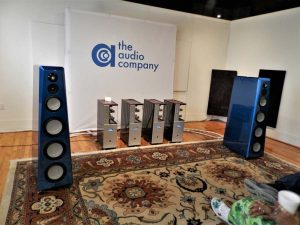№ 33 of High Fidelity's "The Editors Series" of interviews.
"The Editors" is a series of interviews with editors of audio magazines from all over the world—both printed ones, as well as online magazines and portals. It started on January 1st 2012 and 32 interview records have been published so far—the one below will be No. 33. Our aim is to make our readers more familiar with the people who usually hide behind the products that we review. It is the "WHO IS WHO?" of specialized audio press.
I will not exaggerate at all if I say that the American magazine Stereophile monthly is one of the most important audio magazines in the world; for many—the most important one. Regarding the renown and respect it has, it can only be compared to the Japanese Stereo Sound which is, however, limited to the Asian market (it is also published in Chinese).
The cover of the 500th issue of the Stereophile magazine from August this year—congratulations!
I have a reason to recall the Japanese quarterly—its latest 220th includes extended bios of its journalists, celebrating the magazine's 55th anniversary in this way (Stereo Sound № 220, Autumn 2021, pp. 70-113). It so happens that Stereophile was already four years old then and its "subjective history" was presented by Jonathan Scull in this year's autumn issue ("500 Issues and Counting," Stereophile Vol. 44 No. 8, August 2021, pp. 41-47). The magazine has been published for 59 years and over 500 issues with its logo on the cover have been published.
The fact is also that only three people have been in charge of the magazine: its founder J. Gordon Holt in the years 1962-1986, John Atkinson, the former editor-in-chief of the British Hi-Fi News and Record Review, in the years 1986-2019, while, since March 2019, the editor-in-chief has been Jim Austin. During that time, the magazine changed its owner a few times, its format, publishing frequency and even the headquarters—it had a seat in Santa Fe for 22 years.
It currently belongs to AVTech Media Americas Inc., the American branch of the British AVTech Media Ltd (UK) company, together with Hi-Fi News and Record Review (!) Hi-Fi Choice and Home Cinema Choice as well as the American Sound & Vision and Shutterbug. The latter has been published for almost 50 years and is now an online photography magazine. The internet portal Analog Planet run by Michael Fremer is also part of the family. Let us add that the present editor-in-chief of HFC, the head of the EISA award committee for many years, Paul Miller, is the CEO of AVTech Media Ltd (UK).
One thing has not changed during this time—Stereophile is a magazine that one must know and respect. Jim Austin, its editor-in-chief, is being interviewed by Wojciech Pacuła.
INTERVIEW
Wojciech Pacuła Tell us about yourself—your career, etc. And your audio passion.
Jim Austin I've always been torn between writing and science. And music. In grade school, I had an audio system, pretty modest, but beyond what most kids had. I played the trumpet. I got pretty good. I was one of the best high school trumpet players in the state of Florida (which is known for its marching bands). I gave up the trumpet after high school, being young and foolish. And although the hi-fi got a lot of use in college, I pretty much forgot about it after that.
Jim Austin in person—he writes that the photo is already a few years old: "When I look in the mirror, I see longer and grayer hair—and I look older."
In college, I started out as a double-major engineering and English literature. I soon switched from Engineering to physics, which became my major. I kept studying literature throughout college, but I didn't take the major because I didn't take the right courses or attempt the final exams.
After graduating with a physics degree, I took a job as a newspaper reporter. That lasted less than a year before went back graduate school—I actually got a pay raise—in physics, earning a Master's degree and then a PhD. After finishing that degree, I was a researcher for a while, rising through the ranks from post-doc to assistant visiting research professor, to—I'm not actually sure what my final title was, but it wasn't very distinguished.
My PhD adviser retired, and I took over the lab. My research was nothing to do with hi-fi or sound—I studied materials using methods drawn from nuclear physics. I co-edited one very thick book, Accelerator-Based Atomic Physics Technics and Applications. After a few years, I gave that up my science career to follow my wife, when she was offered a faculty position at an excellent small college in New England—in the state of Maine, specifically.
For a while, I didn't do much. I did some writing and a lot of work around the house, cutting and splitting firewood, fixing things up. I taught writing for a while, part time, at the college where my wife was on the faculty. We had a son and I helped raise him. Eventually, I got connected to a few decent writing gigs. It was the late 90s and the Internet was going crazy, and I started up a web-based lifestyle publication. It was all about living a meaningful life that's not about making money. It was pretty good, but it never made any money, and then the dot-com bubble burst and any prospects it might have had disappeared.
In early 2001, I learned about an opening at Science magazine, which, if you don't know it, is a very serious, hard-core science magazine. I applied for and got the job. Ironically for a guy who had left his science career several years before, my main writing/editing beat was careers in the sciences. At first, I worked exclusively online. In time, I took on some print responsibilities, including for a page very similar to "My Back Pages" in Stereophile.
I spent 14 years as an editor at Science, so I learned a thing or two about editing. My son grew up and finished high school. Then I left that job, too, once again following my wife when she accepted a prestigious endowed professorship at Barnard College, the women's college at Columbia University. That's how I came to New York.
The article in which Jonathan Scull describes the magazine’s history
Around the time I started at Science—I guess it was a few months after—I had a birthday. My father-in-law decided I needed new speakers. At first it was a secret, and I couldn't figure it out—what is it they're planning to get me for my birthday? I ended up with a pair of Vienna Acoustics Bachs as a birthday present. That was, as they say, my gateway drug: it re-ignited my interest in hi-fi, and within a year, I had published my first piece in Stereophile, a front-page "As We See It" essay.
I remained a low-volume, low-visibility freelance contributor to the magazine for about 18 years. It was something I did on the side, just for fun. Then John Atkinson decided to retire.
WP Why did you decide to take the torch from Mr. Atkinson? Weren't you afraid—he had been the boss for such a long time...
JA When John decided to retire, Art Dudley (may he rest in peace) was his obvious successor. But Art didn't want the job. I never asked him why.
Hi-fi is a small world, and editing a hi-fi magazine requires esoteric knowledge and a rare set of skills. My knowledge of hi-fi—its history, its conventional wisdom, of specific products—paled in comparison to that of John, Art, Michael Fremer, Kal Rubinson, and some of my other colleagues.
But I was a technical guy with some knowledge of electronics: I'm no amplifier designer but I can read a schematic. I'm also not intimidated by a little math, which helps a bit. I knew something about some areas of science that are relevant to sound reproduction, and I'm not intimidated by room-mode calculations and that sort of thing. And I was—am—an experienced editor. I was, as they say, hiding in plain sight.
At a holiday lunch in 2018, Art Dudley approached me and asked, "How would you like to play a larger role at Stereophile?" That was exciting. I thought, "Wow, they're going to offer me a column!" It was a few weeks before I realized what they really had in mind.
So, I was qualified in many ways, but I was low-profile, without much of a reputation in the industry. The idea of stepping into a position of leadership—yes, it was scary. Stereophile is a very important hi-fi magazine, easily the one with the widest reach on this continent. What's more, I'd be only the third editor in Stereophile's long history, following in the footsteps of two legends, John Atkinson and J. Gordon Holt. So, yeah, I was intimidated. It's a big job, and even though I was only in my early/mid 50s, I was feeling happily semi-retired: Did I really want all that responsibility? I thought I was up to the challenge, and I was right.
Stereophile's website; date of access: 25.10.2021.
WP How does your leadership differ from Mr. Atkinson's way of running the magazine?
JA In fact, I don't really know much about John's leadership. Remember: I was just an occasional freelancer; I wasn't that close to the organization. But I can tell you about my priorities, at least some of them.
I want people to talk freely—to engage in respectful dialog—without worrying too much about image or reputation. To take risks. I have a thick skin and I want feedback, negative and positive. Based on my experience, I probably work more closely with writers on their writing than John did. I want my writers to get better.
In relating to the outside world—and in coaching reviewers on how they should conduct reviews—I put a high priority on professionalism. Stereophile exists to serve its readers, but there are some things we owe the companies whose products we review, such as competence, professionalism and courtesy. I want audio companies to feel they've been treated fairly and well, and that we've done our job professionally, even if they don't like a review's outcome.
When it comes to reviewers, I have a no-prima-donna policy. I also expect a certain amount of self-reflection. They should constantly be asking themselves: Am I sure? They need to make sure they're judging freely and fairly. They need to remember that it's about the product and not about themselves. If they aren't capable of that, they may not be a good fit.
Jim Austin's reference system—the Wilson Audio Alexx V speakers, Pass Labs XP-25 preamp, Pass Labs XP-60.8 monoblocks and SME 30/12 turntable with Orotfon Windfield Ti cartridge; High Fidelity website is open on the laptop.
WP What was your idea of Stereophile when you became its editor-in-chief?
JA That it was already a successful magazine with a long, influential, distinguished history. This wasn't an exercise in crisis management; I just had to avoid messing up a good thing. So my focus was on continuity, working around the edges to make certain improvements without changing the basic approach.
Stereophile has, since its founding, been a subjectivist review magazine. We review by listening, long-term, in the context of a familiar system. I'm continuing that. Listening is supplemented by careful measurements: I'm continuing that, too. Stereophile remains an old-fashioned, editorially independent magazine. Reviewing and advertising are independent of each other. There's no "pay-to-play," no connection between advertising and reviewing—whether a review is performed at all, or the outcome. I'm continuing that.
I thought the magazine needed strengthening on the music side; it had declined since we lost our Music Editor, Robert Baird. I introduced the Revinyilization section which is about vinyl reissues. It was intended as an Art Dudley vehicle; since his death—another way of getting his excellent voice into the magazine. Since he died, I've moved it around. I also added Re-Tales which is about how our industry works. Re-Tales is an insider's piece, intended for industry members and for casual readers, to help all be better informed and feel more connected.
I'm publishing more music reviews than Stereophile did before; I'd like to publish more still. I'd love to have more pages so that we could review more products; we'll see how that goes. Finally, I continue to bring in, selectively, talented younger writers, partly to attract younger readers but also to ensure that Stereophile has the expertise it needs going forward. Some of us aren't as young as we used to be...
WP What do you think about printed press? What are its strengths and what are web-based magazines good at?
JA Web publications are timely and (if not behind a paywall) accessible, but there are too few filters. If you need to disseminate information quickly, there's no better way. But there's an immense amount of dreck online and it's continuing to pile up.
A lot of people are publishing video reviews these days, but only a few of them seem to know anything. Others look pretty and have a nice screen presence but have nothing intelligent to say. In written reviews, space is essentially free, so some people will put anything up. Online, good information tends to be buried in a pile of bad, which makes it not so useful if you really need to learn something. Plus, on social media, you see the same extremist passion you see in politics. For audiophiles, it's the Wild West.
Please note that I'm talking about a reader going online and trying to learn something and about trends I've noted. I'm not commenting on any particular online publication. They're all over the map in terms of quality.
From my vantage, print seems surprisingly stable from a business perspective—more stable than I would have expected, say, 15 years ago. In our industry at least—or maybe I should say, at Stereophile, at least—it remains viable and profitable. It's essential, though, to think about the future. To stake one's future on print isn't so different than staking the future of reproduced music on vinyl records, if you get my drift.
WP What magazines do you read?
JA Who has time to read magazines? I get the New Yorker and occasionally I'll read a story.
Jim Austin's reference system continued (during a test); Swiss CH Precision devices—the D1.5 transport, C1 DAC, clock and amplifier—on an HRS stand placed in the front. The Roon Nucleus+ and NAS Synology are located on the side.
WP Do you think that we, audio writers, are going to be replaced with an AI algorithm in the future?
JA I'm quite familiar with the AI world, as my son deals with it (at Google).
I get the impression that we are secured against artificial intelligence, as it is a very human undertaking. It is all about human experience. Inner experience. And if there is something that we know about artificial intelligence is that it is inscrutable. It often gives us the right answers, but we almost never know why. Artificial intelligence may have its models in the human brain, but it is alien to us.
I suppose it is possible that artificial intelligence might convincingly forge an audio review one day, but you need a cynical approach to believe that this may really happen—and I am not cynical.
WP What is the most important part of an audio system and why?
JA I guess I can understand why some people have claimed that the source is the most important part. After all, that's where everything starts and, if something's missing, you're not going to be able to pick it up later in the chain.
And yet, the most important part of an audio system—and I'm excluding the listener here—is the part that varies the most: the loudspeaker and the room it interfaces with. The room is an extension of the loudspeaker. In Stereo Sound, it's an essential part of music reproduction: you can't just take the room out of the picture—by deadening the room—or the music won't sound good. In stereo hi-fi you need the room with its acoustics.
But the room, the speaker, and the room-speaker interface is responsible for huge variations in the sound of a system, whereas a source component usually causes only small changes (I should make an exception for phono cartridges here, which can also have a pretty big effect). After that, I'd put amplifier-loudspeaker interactions, at least with certain old-school tube amps.
WP How about the amp/speaker combination—low power/high sensitivity or the other way round?
JA I recognize the sonic virtues of low-power/high-sensitivity, but I've never thought it is worth the compromises that come with it. I generally prefer well-made, moderately high-sensitivity speakers (say, 90–92dB/2.83V/m) of a mainstream multi-driver design, used with reasonably powerful amplifiers.
WP Do you believe then that active speakers will become the main "course" in audio?
JA It certainly makes a lot of sense to custom-match amplifiers and loudspeakers. For that matter, it makes a great deal of sense to make everything digital, so that you can use DSP to overcome the many technical shortcomings of conventional passive loudspeaker designs. Is there a trade-off, something sacrificed from all that digital/active manipulation? I'll let you know when I'm sure.
Jim Austin's reference system—one of the Pass Labs monoblocks with the Nordost QBase power strip next to it, with Odin 2 cables from the same manufacturer.
But, for many people, this is a heart-vs.-head thing. No matter how good the new technology, they love wrangling with the imperfections and making the most of it. What I wrote near the beginning about the interaction between loudspeakers and rooms applies here, metaphorically. Ours is an avocation that thrives on imperfection; perfection is boring. And playing around with component-matching is fun.
WP So, how about the source—analog or digital? And, if digital—streaming, CD or SACD?
JA There are few things I love more than playing records on a Friday or Saturday night. I grew up with vinyl and I still love it.
But I'm pretty convinced at this point that high-resolution digital—let us say 24/192 PCM and certainly DXD—is capable of total transparency, at least for me. Maybe others can detect a sonic signature—but play me an exquisitely made 24/192 needle drop and I can't distinguish it from the original vinyl.
To me, high-res digital is a (potentially) transparent container for music, with no sound of its own, while vinyl is a true medium that has a particular sound.
Except for vinyl, I don't go in for physical discs. CDs never excited me, although I've bought plenty of them in my life. I'd rather play a file from a player—or a streaming service—than stick a silver disc in a player. That's not a commentary on quality; it's a personal preference. A few years back, I spent a whole winter ripping CDs, so my CDs are all in boxes.
WP Tell us please about 10 best recordings our readers should buy right now and why.
JA If, someday, I get around to putting together such a list, I will publish it in Stereophile instead and send a link.
WP Describe your reference system to us, please.
JA My reference system is ever-changing. It's made up of whatever components have been in it long enough that I'm familiar with how they sound.
A manufacturer once said to me that he didn't think reference components were a good idea for reviewers because we get emotionally attached and that's not fair to components under review. He had a point. If you ever find yourself defending what you use, especially against defensive manufacturers, then you may be too attached to your reference system. For a critic, a reference system is a tool, not something to love.
But that's at least 50% nonsense, because a huge part of the audio avocation is the enjoyment we gain from listening to music through the components we love. For a critic to separate himself or herself from that experience is to cut (him/her)self off from listeners and readers. I guess my answer is sort of an emotional compromise: I enjoy the company of the components in my system, but the relationship is pretty casual. No marriage is planned.
Jim Austin's reference system continued—the enormous new Wilson Audio Alexx V loudspeakers being tested now
So, what's in my system? The source is an SME 30/12 turntable with an Ortofon Windfield Ti cartridge. A couple of different phono preamps: A Pass Labs XP-25 (review forthcoming) and a Sutherland Engineering current-mode prototype. The amplifiers I use most of the time are the PASS LABS XP-60.8 monoblocks, which are rated at 60W into 8 ohms but are far more powerful than that (60-watts are class-A). It is surprising that these amps have no problem powering the large Wilson loudspeakers that are sensitive enough, but with a demanding impedance curve. I also have a Pass preamp—an XP-22.
The only serious speakers in-house right now are the ones under review, the new Wilson Audio Alexx V. I'll keep those around for a few months after the review is over, so, for a while at least, they'll be my reference loudspeakers. Then I'll bring in a new pair of speakers for review.
I use a mix of cables, and I often switch them out, but these days it's mostly Clarus Crimson. Despite my physics background, which offers few convincing explanations for why and how cables can affect the sound of a system, I do believe that they do, and I believe that ultimately one has to try things and see what works best. But a reviewer system—my reviewer system, anyway —is always so in flux that I rarely get to that level of refinement.
WP Thank you for the interview and I wish you all the best!
JA Thank you so much. Sending my best regards to High Fidelity readers!
Jim Austin, Editor-in-Chief
Stereophile
Publisher: AVTech Media Americas Inc.
Publication type: Print
Publishing frequency: Monthly
Year of establishment: 1962
Interviewer: Wojciech Pacuła
Images: Jim Austin















































